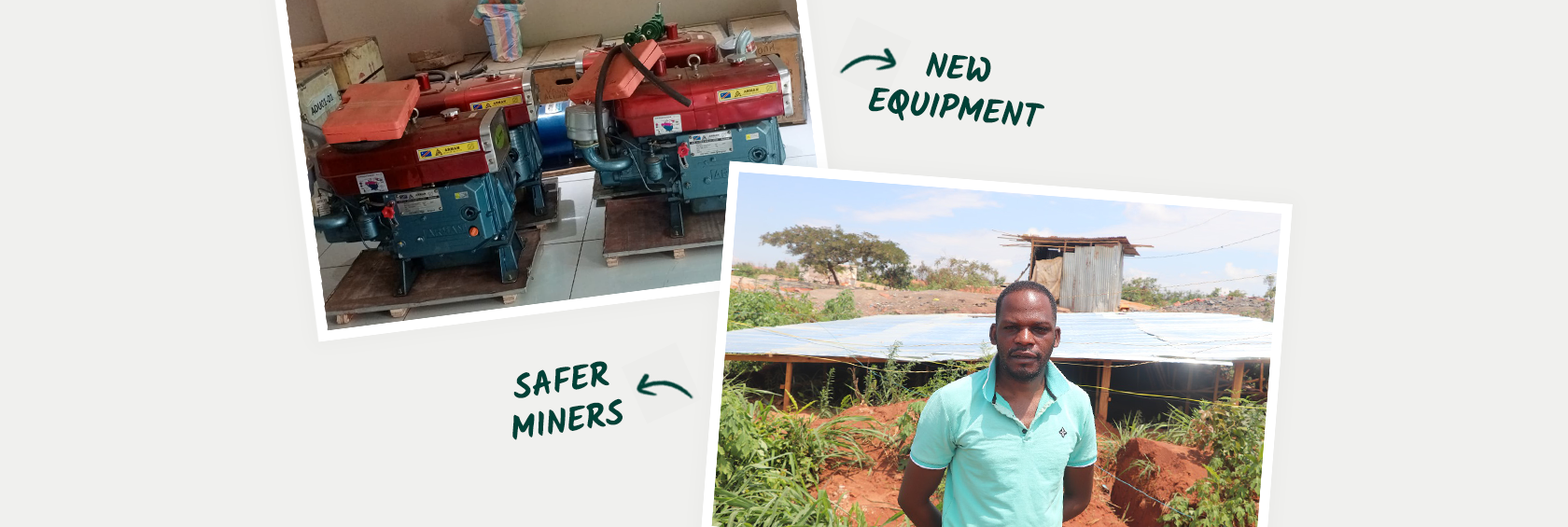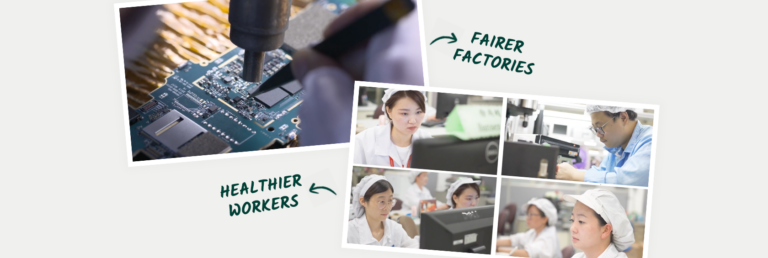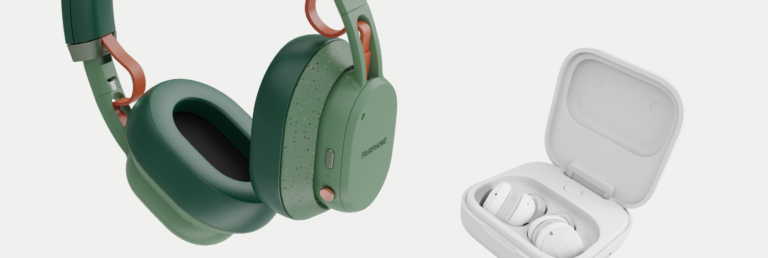This is how cobalt credits are helping mines become fairer
In August 2023, the Fair Cobalt Alliance (FCA) introduced a new sourcing model for the artisanal and small-scale mining (ASM) sector called Cobalt Credits. The newly launched system was designed to reduce risks in cobalt supply chains and help speed up continuous improvements towards responsibly produced ASM copper-cobalt. As a co-founding member of the FCA, Fairphone was proud to be the first to purchase these credits at the time, investing approximately USD $12,000 for around 2.5 tonnes of cobalt that would account for our total cobalt consumption in 2023. This was a momentous occasion for us and the FCA, mainly because in Democratic Republic of Congo, most artisanally-mined cobalt flows into global supply chains from sources unknown.
DID YOU KNOW?
Cobalt is mainly used in the production of lithium-ion batteries for smartphones. It is a key component of the cathode inside, where it helps improve energy density, stability, and overall battery life.
How do Cobalt Credits work?
The backbone of Cobalt Credits is a ‘book and claim’-based credit system that allows downstream companies to financially contribute to improvements at upstream ASM mine sites, enabling and incentivizing them to aspire to responsible and ethical production of cobalt. To purchase a credit, the company pays a premium of $5000 per tonne of cobalt produced at the mine site. This is equal to 10% of the average price of a tonne of cobalt over the past three years. A credit within the system signifies that an equivalent amount of cobalt was produced and sold by a mine site that has satisfied basic sustainability criteria, and is committed to continuously improve environmental, social, and governance (ESG) performance. Read more about the cobalt credit system here.
So after a company purchases a set number of credits, the funds go to a Fund Allocation Committee that operates under the aegis of The Impact Facility, the permanent secretariat of the FCA. The Committee includes representatives from the FCA, local partner Coopérative Minière pour le Développement Social (CMDS) that manages multiple ASM sites in the DRC, and four key worker groups; women washers, diggers, transporters, and sailiseurs (they bring the product from the pit bottom to the surface), and decide where the funds should go. A mine site’s participation is dependent on complying with minimum criteria, ensuring worst practices are excluded, and that they show a commitment to continuous improvement.
Selected mines have the possibility of investing in four key areas, namely good governance, safe and dignified working conditions, environmental protection, and inclusive economic development. The mine site is then actively assisted by The Impact Facility to make the required investments and upgrades that will help it comply with downstream requirements for responsible production. Meanwhile, companies can keep buying credits to cover their cobalt consumption, while supporting continuous mine improvements.
“Responsible sourcing starts with taking responsibility. This is why Fairphone developed and piloted the Cobalt Credits together with the FCA and The Impact Facility. This book and claim sourcing mechanism works as a way for companies to prevent and mitigate risks in supply chains (step 3 in the due diligence cycle), and to enable more responsible and safer artisanal cobalt production in line with their own cobalt consumption. At Fairphone, of course, this does not reduce our obligation to conduct due diligence into our cobalt supply chain. In fact, both go together – we know that the cobalt we use comes from the DRC and that it is highly likely that at least part of it is sourced from ASM. The purchase of cobalt credits, and generally our engagement in the FCA, is a way for us to address these salient issues in our supply chains and invest concretely in prevention, mitigation, and positive improvement for the mines and workers that need it most – in line with our footprint and responsibility.”
Angela Jorns, Head of Impact Innovation at Fairphone
So how was Fairphone’s investment eventually used?
The funds from our credit purchases have been invested in upgrades and improvements at the artisanal cobalt-copper mine site of Kamilombe. The project selection process began with the FCA team conducting sensitization and awareness sessions with Kamilombe Cooperative partner mine site members, holding meetings with different worker groups to introduce the mechanism, and facilitating elections to select representatives for the Fund Allocation Committee.
A workshop was organized for the elected representatives to demonstrate how to submit proposals for consideration under the mechanism. With funds available from the pilot with Fairphone, representatives were also guided on the procedure to submit proposals using the template developed by The Impact Facility. After a lot of deliberation, these are some of the projects submitted and approved by the Fund Allocation Committee (FAC) that the FCA is currently working on.
PROJECT #1: The provision of dynamos coupled to engines to support mine site ventilation
The deeper an underground pit, the lower the natural air circulation and, subsequently, lower oxygen levels for miners underground. The lack of ventilation underground exposes miners to the risk of oxygen deprivation, which may lead to suffocation and, in some cases, fatalities for miners. To remedy this, miners often use blowers powered by dynamos to increase air circulation underground.
Previously, at the Kamilombe mine site, the miners would have to rent out the dynamos needed, as the cooperative did not possess any. On top of the rental fee, the diggers were obliged to maintain the dynamos and purchase the fuel needed as well—an easy profit-making scheme for the owners of the machines. That’s why one of the projects that was approved was the purchase of dynamos for the cooperative.
A cost-effective supplier was identified and approved jointly by the FCA and the workers themselves, and eight dynamos and eight engines were purchased for a total of USD$8,000. Simultaneously, the cooperative supported the diggers in creating an installation and management plan for the dynamos to ensure their efficient use and maintenance.
As of today, all eight dynamos have been installed and are being used on-site, providing underground ventilation to 129 pits at the mine site, benefitting 5,220 underground workers. This means not only drastically reduced operating costs for the miners and the cooperative, but also improved worker safety. Installing the dynamos has reduced the risk of suffocation and gas poisoning in underground galleries. As a result, there are more diggers and stabilizers willing to work as well. Instead of the usual 40 diggers per shaft, there are currently 70 diggers per shaft.
PROJECT 2: The provision of elbow-length gloves for the washerwomen on-site
To increase the purity of the ore, many artisanal sites ‘wash’ the minerals before they are sold to mineral-buying depots. Washers, predominantly women, execute the task of washing, getting paid per bag of ore washed. They rinse off any dirt by repeatedly lifting a metal net or a plastic bag lightly filled with ore and applying pressure to keep the ore in motion using their feet. It is common practice to stand directly in the water, often barefoot and without appropriate personal protective equipment (PPE). As you can imagine, this exposure to chemically polluted water comes with severe health risks. The high concentration of heavy metals in the water can cause skin reactions, inflame open wounds and micro-cuts that result from handling the sharp ore, and even lead to bladder infections.
With support from the FCA, women washers already have access to wader boots, available through a daily rental fee that is subsidized by the cooperative. These are proven effective in preventing direct contact between their feet and the chemical-laden water, although they do not protect their hands. That’s why the women washers’ representatives submitted a proposal to the FAC for gloves suited for ore washing for use during their work. The proposal would benefit over 200 women washers at the Kamilombe mine site.
Unfortunately, while different local and regional suppliers for the gloves were scoped out for the job, the samples that were received were too big and not suitable for mineral washing. Whilst the women washers have proposed an alternative project, the FCA team continues to search for more suppliers in order to meet the needs of the women.
PROJECT 3: Construction of changing rooms for women washers
Currently, the women washers at Kamilombe do not have a dedicated changing room to change in and out of the wader boots. To remedy this, the women at the mine site have submitted a proposal for the construction of a changing room for their use.
Two quotes for the construction of the project have been received by The Impact Facility team, and a supplier will be picked in the coming weeks to start construction. It is estimated that the cost of construction will be around USD $8368 for a wooden frame and USD $9677 for a metal frame construction. However, this is a small price to pay to improve working conditions for the 200 women washers here and improve the dignity of their labor
TO SUM IT UP
An estimated 150,000 to 250,000 people earn a livelihood from the artisanal cobalt sector in the Democratic Republic of Congo. Their efforts put out over 10,000 tonnes of cobalt per year, valued at over 300 million US dollars. While our efforts have helped establish a pilot for Cobalt Credits thanks to the excellent work by the FCA and Impact Facility, our investment is literally a drop in a potentially vast ocean. If we want to make a more significant impact in the sector, we’re going to need to see more investment, with more players investing in cobalt credits asap.
If your organization is looking to create long-lasting positive change across artisanal and small-scale cobalt mining communities in the DRC, please reach out to secretariat@faircobaltalliance.org



